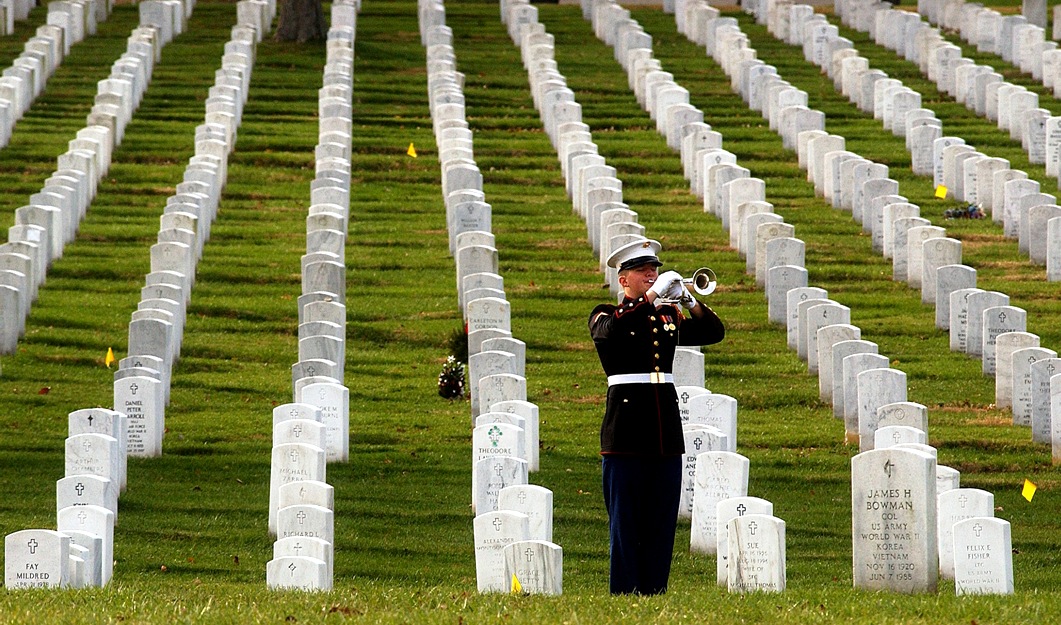Monday – Memorial Day
When on Memorial Day we lift up the memories of those who have died, we must be very careful that we do not also romanticize war. Because we don’t want to see the deaths as meaningless, we sometimes rationalize the conflicts that killed them.
Laurence Binyon’s “For the Fallen” (1914) is guilty of the romanticizing I have in mind. Excerpts of the poem are often read at military funerals and many have found comfort in it, so I don’t want to dismiss it altogether. As I read it, however, I also imagine how Wilfred Owen would have responded:
For the Fallen
By Laurence Binyon
With proud thanksgiving, a mother for her children,
England mourns for her dead across the sea.
Flesh of her flesh they were, spirit of her spirit,
Fallen in the cause of the free.
Solemn the drums thrill; Death august and royal
Sings sorrow up into immortal spheres,
There is music in the midst of desolation
And a glory that shines upon our tears.
They went with songs to the battle, they were young,
Straight of limb, true of eye, steady and aglow.
They were staunch to the end against odds uncounted;
They fell with their faces to the foe.
They shall grow not old, as we that are left grow old:
Age shall not weary them, nor the years condemn.
At the going down of the sun and in the morning
We will remember them.
They mingle not with their laughing comrades again;
They sit no more at familiar tables of home;
They have no lot in our labor of the day-time;
They sleep beyond England’s foam.
But where our desires are and our hopes profound,
Felt as a well-spring that is hidden from sight,
To the innermost heart of their own land they are known
As the stars are known to the Night;
As the stars that shall be bright when we are dust,
Moving in marches upon the heavenly plain;
As the stars that are starry in the time of our darkness,
To the end, to the end, they remain.
Binyon is writing about World War I, which he watched from the sidelines as he was in his forties. I find it a dangerous poem. I can see young men reading it and feeling a tragic pride that they may well have to give up their lives “in the cause of the free.” They are certain that they will be “staunch to the end” and that they will fall “with their faces to the foe.” They are comforted with the thought that their deaths will be “august and royal,” that the tragedy of their dying will mingle with the music of the spheres, and that they themselves will be “stars that shall be bright” when all the rest of us are dust.
I wonder if Wilfred Owen is talking directly to Binyon as he attacks people for romanticizing war. For instance, to Binyon’s talk of drums, music, and august funeral ceremonies, here’s what Owen has to say in “Anthem for Doomed Youth”:
What passing-bells for these who die as cattle?
— Only the monstrous anger of the guns.
Only the stuttering rifles’ rapid rattle
Can patter out their hasty orisons.
No mockeries now for them; no prayers nor bells;
Nor any voice of mourning save the choirs,—
The shrill, demented choirs of wailing shells;
And bugles calling for them from sad shires.
What candles may be held to speed them all?
Not in the hands of boys, but in their eyes
Shall shine the holy glimmers of goodbyes.
The pallor of girls’ brows shall be their pall;
Their flowers the tenderness of patient minds,
And each slow dusk a drawing-down of blinds.
To Binyon’s talk of “a glory that shines upon our tears,” I hear the final line of Owen’s “Greater Love”: “Weep, you may weep, for you may touch them not.” In other words, “Save me your sentimental tears. You don’t know the half of what we have been through.” Owen knows better than to judge soldiers on whether they stood staunch or not.
In Binyon’s defense, there were a number of people who thought as he did in 1914, including Owen himself. So did Rupert Brooke, when he penned the sentimental,
If I should die, think only this of me:
That there’s some corner of a foreign field
That is forever England.
And Alan Seeger, when he belted out,
I have a rendezvous with Death
At some disputed barricade,
When Spring comes back with rustling shade
And apple-blossoms fill the air—
I have a rendezvous with Death
When Spring brings back blue days and fair.
It may be he shall take my hand
And lead me into his dark land
And close my eyes and quench my breath…
Before concluding,
And I to my pledged word am true,
I shall not fail that rendezvous.
Seeger personalizes death as a dark mistress to whom he must be heroically and fatalistically true, the highwayman in Alfred Noyes’s ultra-romantic poem by that name. Death in Seeger’s vision is accompanied by apple blossoms. Owen’s answer in “Dulce et Decorum Est” is a soldier dying of mustard gas:
Brooke and Seeger both died before they saw the full extent of World War I’s horrors (in April 1915 and July 1916). Owen’s poetry took its dark turn in 1917 and he would live almost to the end, dying a week before the Armistice. Perhaps one could be romantic in the early years but not after the war entered its third year.
So when you honor our fallen soldiers today, perhaps this is the best way to memorialize them: shut your ears to war rhetoric and dedicate your efforts to making sure that future young people won’t follow in their footsteps. And that future parents, siblings, relatives, and children won’t have to mourn.
